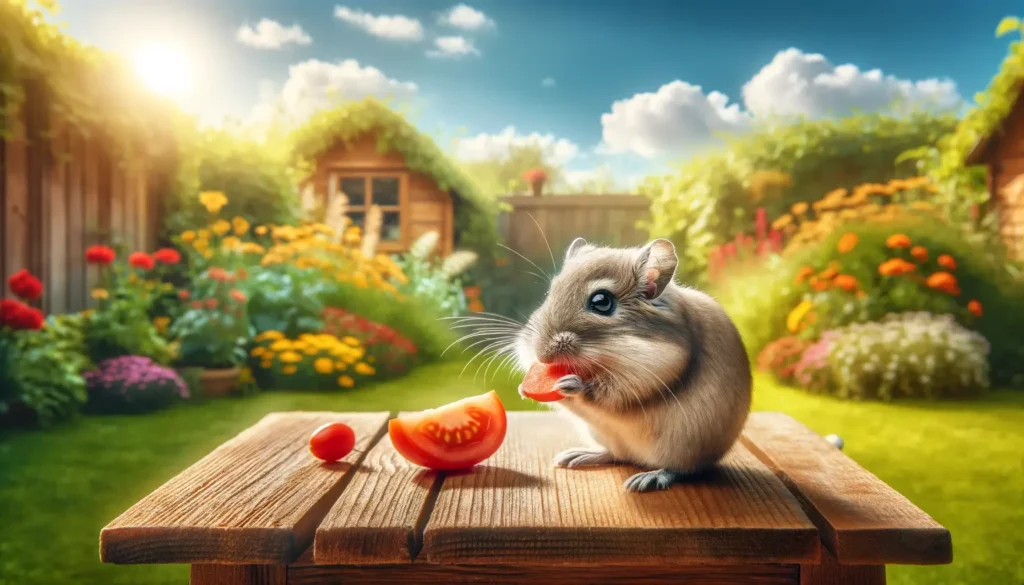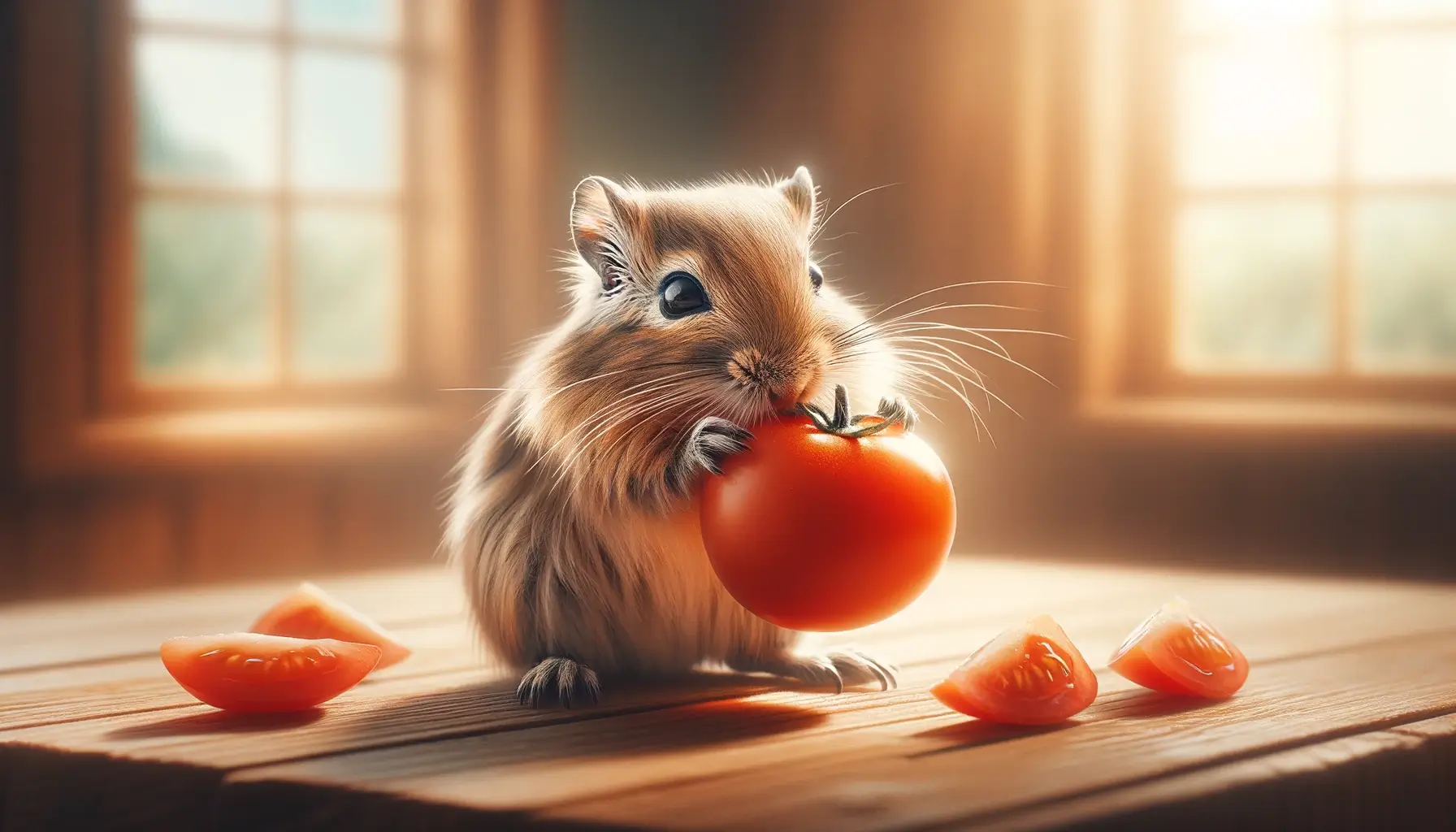Gerbils are fascinating and energetic pets that bring joy to their owners with their playful antics and curious nature. As a gerbil owner, ensuring your furry friend has a balanced and nutritious diet is crucial for their health and happiness.
While gerbils primarily thrive on a diet of seeds, grains, and occasional fresh produce, many owners wonder about the safety of feeding tomatoes to their pets.
This article delves into whether gerbils can enjoy this common household fruit, outlining the nutritional benefits, safe feeding practices, and essential precautions to keep in mind.
Nutritional Benefits of Tomatoes for Gerbils
Tomatoes are a staple in human diets around the world, known for their versatility and health benefits. But do these benefits extend to our gerbil companions? The answer is yes, but with moderation and proper preparation.
Tomatoes are rich in vitamins A and C, antioxidants, and dietary fiber, which can contribute positively to a gerbil’s diet. These nutrients support immune system health, aid in digestion, and can help prevent diseases.
However, it’s important to remember that tomatoes should only be a small part of a gerbil’s diet. The primary reason is their high water content, which, while hydrating, can lead to diarrhea if consumed in excess.
Additionally, the natural sugars in tomatoes, although not harmful in small amounts, can lead to obesity and dental problems if overfed. Therefore, while tomatoes can offer nutritional benefits to gerbils, they should be introduced carefully and in moderation.
| Nutrient | Amount | Unit |
|---|---|---|
| Energy | 18 | kcal |
| Water | 95 | g |
| Protein | 0.88 | g |
| Total lipid (fat) | 0.2 | g |
| Carbohydrate, by difference | 3.89 | g |
| Fiber, total dietary | 1.2 | g |
| Sugars, total including NLEA | 2.63 | g |
| Calcium, Ca | 10 | mg |
| Iron, Fe | 0.27 | mg |
| Magnesium, Mg | 11 | mg |
| Phosphorus, P | 24 | mg |
| Potassium, K | 237 | mg |
| Vitamin C, total ascorbic acid | 13.7 | mg |
| Vitamin A, IU | 833 | IU |
| Lycopene | 2573 | µg |
How Can Gerbils Safely Eat Tomatoes?

Feeding tomatoes to your gerbil requires some preparation to ensure their safety and health. Here’s how you can safely incorporate tomatoes into your gerbil’s diet:
- Choose the Right Tomato: Opt for ripe, fresh tomatoes. Avoid unripe or green tomatoes, as they contain solanine, a toxin harmful to gerbils. Cherry and grape tomatoes are excellent choices due to their small size and ease of preparation.
- Preparation: Wash the tomato thoroughly to remove any pesticides or chemicals. Cut a small, bite-sized piece suitable for your gerbil’s size. Remove the seeds and the inner part of the tomato to reduce the water content your gerbil will consume.
- Feeding Frequency and Portion Size: Introduce tomatoes into your gerbil’s diet gradually. Start with a tiny piece to see how they react and ensure it doesn’t cause digestive upset. If your gerbil enjoys tomatoes and shows no adverse effects, you can offer this treat once every week or two, keeping the portion size small to avoid any health issues.
Incorporating tomatoes into your gerbil’s diet can be a great way to add variety and essential nutrients. However, it’s crucial to do so thoughtfully and sparingly to avoid potential risks associated with overconsumption.
Understanding the Risks and Considerations
While tomatoes can be a healthy treat for gerbils, it’s essential to approach their inclusion in your pet’s diet with caution. The primary concerns with feeding tomatoes to gerbils revolve around their acidity and sugar content.
Tomatoes, being acidic, can upset a gerbil’s delicate digestive system if consumed in large quantities, leading to discomfort or diarrhea.
Additionally, the natural sugars present in tomatoes, while not inherently harmful, can contribute to obesity and dental issues if gerbils are overfed.
It’s crucial to monitor the amount of tomato your gerbil consumes and ensure it’s only a small part of a balanced diet.
Alternative Foods and Nutrition
Gerbils benefit from a varied diet that mimics what they would eat in the wild. Alongside a high-quality gerbil food mix, small portions of fresh fruits and vegetables can provide essential nutrients and variety.
Safe alternatives to tomatoes include blueberries, apples (without seeds), and carrots, all of which should be offered in moderation.
Remember, fresh produce should complement, not replace, the core components of their diet, such as seeds and specially formulated gerbil pellets that provide the necessary nutrients for optimal health.
When introducing new foods, do so gradually to observe how your gerbil reacts and ensure there are no adverse effects on their health.
It’s also vital to research and avoid foods that are toxic to gerbils, such as onions, garlic, and chocolate, to prevent potential health issues.
FAQs on Feeding Tomatoes to Gerbils
Can gerbils eat tomato seeds?
It’s best to remove the seeds before offering tomatoes to your gerbil. While not toxic, the seeds can be a choking hazard and may contribute to digestive issues due to their high water content.
How often can gerbils eat tomatoes?
Tomatoes should be considered an occasional treat rather than a dietary staple. Offering a small piece of tomato once every week or two is sufficient to provide variety without risking health problems.
Are there any parts of the tomato plant that are unsafe for gerbils?
Yes, the leaves and stems of the tomato plant are part of the nightshade family and contain solanine, a toxin that can be harmful to gerbils. Always ensure you’re only feeding the fruit part of the tomato, and it’s thoroughly washed and prepared.
Conclusion
In conclusion, while tomatoes can be a nutritious treat for gerbils, they should be given in moderation as part of a balanced diet. By understanding the potential risks and taking the necessary precautions, you can safely incorporate tomatoes into your gerbil’s diet, ensuring they remain healthy and happy.
Always prioritize a high-quality gerbil food mix and consult with a veterinarian if you have any concerns about your pet’s diet or health.











